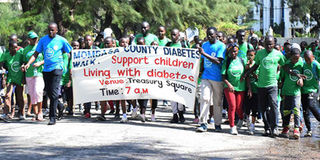Time to turn the tide on NCDs in Africa

Pupils in Mombasa raise awareness of diabetes on July 14, 2018. PHOTO | FILE | NATION MEDIA GROUP
What you need to know:
- Unless financial resources are quickly deployed and political leaders rapidly step up action, this crisis will escalate, threatening the region’s recent gains in healthy life expectancy.
- We must ensure that resources are allocated where they are needed, focusing on those sections of society that are most at risk of being left behind.
An insidious health threat is claiming the lives of more than 40 million people every year. That is an astronomical number — just less than the population of Kenya.
Despite being mostly preventable, these deaths continue to go largely ignored, the risk factors too often unaddressed and investments too low to prevent the unnecessary deaths and suffering that they cause.
What’s killing people is a group of diseases so tragically commonplace that they are very often taken for granted in our societies and communities.
These are non-communicable diseases (NCDs): Chronic conditions which, once they develop, can too often be fatal.
Cancer, diabetes and cardiovascular and lung diseases are the four main NCDs. Together, they have now overtaken all infectious diseases to become the world’s leading killers.
HIV
This is of immense concern for Africa. Across the region, countries are seeing a rapid rise in the number of NCD cases.
Now a person aged 30 to 70 in the region has a one-in-five chance of dying from one of these diseases and, by 2030, that is projected to increase by almost 30 percent.
Unless financial resources are quickly deployed and political leaders rapidly step up action, this crisis will escalate, threatening the region’s recent gains in healthy life expectancy.
Yet I believe African countries have the ability to find the necessary solutions to address this threat, just as they have others before.
I speak from experience. Back in the 1990s, many countries were on the verge of an existential crisis as HIV threatened the lives of large swathes of their populations.
I was shaken when I visited cemeteries and saw how Aids had stolen the future of so many young people.
MORBIDITY
Today, however, while there is still much to be done, HIV-related deaths in Africa have fallen by half — achieved through a multi-faceted approach, including access to treatment, prevention, political engagement and education.
We must learn from these lessons. We must act quickly and tackle NCDs head-on. We must apply the same levels of commitment to protect our citizens as we have done with other urgent health problems, such as Ebola, which capture the headlines.
We must ensure that resources are allocated where they are needed, focusing on those sections of society that are most at risk of being left behind.
We don’t have time to wait. Just as HIV threatened the collapse of already fragile health systems in Africa, so do NCDs place the greatest strain on countries that can least afford these costs.
People affected by heart disease, stroke, cancer or diabetes often require long hospitalisations and costly treatment, with devastating consequences for individuals, families and economies.
Hence, an investment in preventing and tackling NCDs not only protects health but makes sound economic sense.
AWARENESS
The World Health Organization (WHO) estimates that implementing their ‘best buy’ policies for reducing or eliminating risk factors for NCDs in lower- and middle-income countries would not only save more than eight million lives but also generate $350 billion (Sh35tn) by 2030 through averted health costs and increased productivity.
This includes a necessary focus on prevention — ensuring that good health becomes a way of life through the life course.
Globally recommended measures to promote health and beat NCDs include control of tobacco use and harmful use of alcohol through efforts such as taxation and bans on advertising; vaccination of girls aged nine to 13 against the human papilloma virus, combined with effective cervical cancer screenings for women aged 30-49, as well as education and awareness programmes for children, youth and adults and promoting recommended levels of physical activity and healthy diets.
FORUM
The WHO’s first Independent High-Level Commission on NCDs aims to boost political leadership, increase financing and ensure accountability to achieve genuine, long lasting progress in the fight against NCDs and mental disorders.
Its recommendations will help to inform heads of state, who will be meeting at the High-level Meeting on NCDs slated for today at the United Nations General Assembly in New York.
Here, African leaders will have a chance to take a great stride towards health for all by committing, politically and economically, to tackling the world’s major cause of death.
This represents an opportunity to save millions of lives and build a healthier future for people — young and old — across the continent.
It is time we came together and turned the tide on NCDs.
Dr Moeti is the WHO Regional Director for Africa. [email protected]




